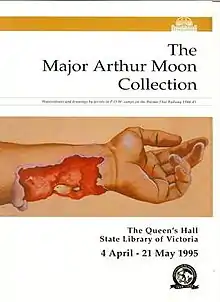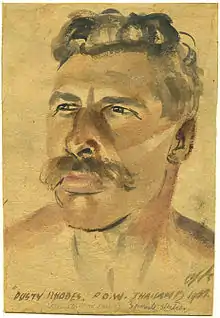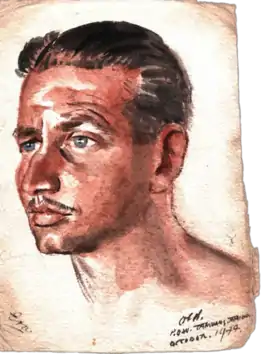Ashley George Old
Ashley George Old (born 1913, d. 2001) was an artist best known for documenting the lives of prisoners of war forced to construct the Thailand-Burma Railway.
Ashley George Old | |
|---|---|
| Born | 1913 Bedford |
| Died | 2001 (aged 87–88) Canvey Island |
| Nationality | British |
| Known for | Painting |
Notable work | The Major Arthur Moon Collection |
During World War II he was stationed in Singapore, and when it fell to the Japanese in February 1942, he was taken prisoner and sent to work on the aforementioned Death Railway.
Training and early career
Old trained at Northampton College of Art, where he was taught anatomy by Lewis Duckett MC, a World War I ambulanceman. Subsequently he worked for the famous commercial art firm Carlton Artists.[1] He later took further training at the Camberwell School of Art.[2]
World War II drawings and paintings
The brutal POW camp conditions and medical treatments in River Valley Road Camp, Changi Prison and Tamuan were extensively documented by Old in a series of drawings and paintings.
Major Arthur Moon Collection

Many of Old's works were buried in the ground and retrieved after the war.[3] They eventually found their way to the State Library of Victoria in Australia where they form part of the Major Arthur Moon collection [4] and can be viewed using the link below.
Often the works are of horrific subject material but contain a haunting beauty.[5] The Major Arthur Moon collection catalogue cover shows a painting of a beckoning hand titled 'Bomb wound (air attack)' and is compared in the narrative to Picasso's Guernica as a truly extraordinary image of war,[6][7] although Old's realistic images versus Picasso's more abstract modern image are of very different types.
Some paintings, such as the birthday card for Major Moon (also showing Edward Dunlop), even manage to find humour in adversity.[8]
Burma Railway Medicine Book
This publication is the result of the long post-war collaboration between the Liverpool School of Tropical Medicine (LSTM) and British ex-Far East POWs.[9] It features several examples of Old's work.
Wartime portraits
A painting by Old of Stanley Gimson, later to become Sheriff Principal of Grampian Highland and Islands,[10] is held at the Imperial War Museum.[11] Gimson's diary, also held by the museum, records the details of the sitting. The entry, while admiring, betrays the class attitudes of the time:
Had my portrait painted again, this time by a Northampton man named Old. He is a great hulking, fair-headed yokel with a face like a harvest moon – faintly reminiscent of Holbein’s Henry VIII. As he works he keeps up a continuous monologue – “That’s excellent – interesting position that – now will get the eyes”. His work is splendid though doesn’t seem to be in keeping with his character. The watercolour he did today is a fine piece of work, but is too much glamorised. I wish I could send it home – it would dispense of all fear.
The extraordinary speed with which Old could work, even under the most difficult conditions, is clearly shown by the portrait of "Dusty" Rhodes, which Old records as having been done in three minutes.
The portrait of Ernest Warwick is another example of the 1000 or so portraits Old is reported to have painted, although only 18 are known to have survived.[12]


Contemporaries
Old was a contemporary of fellow FEPOW artists Jack Bridger Chalker, Philip Meninsky and Ronald Searle, all of whom risked their lives on a daily basis to make these historic records.
Old and Meninsky were reunited in 1995 after 50 years as guests of the Imperial War Museum for an exhibition Victory in the Far East – held 15 August to 15 December 1995.[13]
Later works
Until his death in 2001 the artist remained both deeply traumatised and enchanted by his experiences in the jungle while a POW. These conflicting emotions are evident in many of his later works; both horror and beauty are shown in the woodlands scenes below. These were painted at Cupid's Green, near Hemel Hempstead, in 1959. The artist spent many months there observing and recording the area's change from an old market town to one of the post-war 'New Towns'.
 A dark view of the woods at Cupid's Green
A dark view of the woods at Cupid's Green The woods at Cupid's Green transformed into a jungle
The woods at Cupid's Green transformed into a jungle
References
- Legion – The Journal of the British Legion Vol. 16 No.4
- Newspaper cutting held by the IWM Art Department.
- "Works of Ashley George Old held at State Library of Victoria". Search.slv.vic.gov.au. 1994-11-06. Retrieved 2012-01-31.
- http://suchwaslife.blogs.slv.vic.gov.au/2013/04/01/the-major-moon-collection/#.VEgxst5yc-Y
- SLV Major Moon Collection narrative
- "Bomb wound (air attack)". Slv.vic.gov.au. 1945-01-03. Archived from the original on 2015-09-24. Retrieved 2012-01-31.
- The Major Arthur Moon Collection: watercolours and drawings by artists in P.O.W. camps on the Burma--Thai Railway 1944-45. Edited by Mary Lewis. Melb. Vic. : State Library of Victoria
- "Birthday card for Major Moon". Slv.vic.gov.au. 1944-05-07. Archived from the original on 2013-06-21. Retrieved 2012-07-05.
- http://www.lstmed.ac.uk/about/history/far-eastern-prisoners-of-war-fepow/burma-railway-medicine
- http://www.scotsman.com/news/obituaries/george-gimson-1-664038
- http://www.iwm.org.uk/collections/item/object/20591
- https://www.captivememories.org.uk/sites/fepow/files/upload/Two%20Portraits%20of%20Charlie%20Proctor.pdf
- Legion – The Journal of the British Legion Vol. 16 No.4